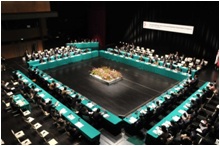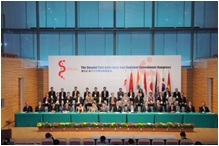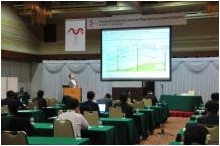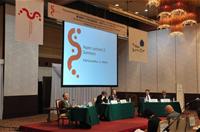Participating local and regional governments: 45 governments from 6 countries
(China, India, Philippines, Korea, Vietnam, Japan)
<45 governments>
■China(7):Anhui Province,Shandong Province,Henan Province,Shaanxi Province,Xi'an City,Yangzhou City,Huangshan City
■India(1):Varanasi City
■Philippines(2):Benguet Province,Aurora Province
■Korea(7):Gyeonggi-do Province,Chungcheongnam-do Province,Gongju City,Buyeo County,Jeollanam-do Province,Gyeongsangbuk-do Province,Gyeongju City
■Vietnam(3):Thua Thien Hue Province,Hue City,Hoi an City
■Japan(25):Aomori Prefecture,Yamagata Prefecture,Fukushima Prefecture,Niigata Prefecture,Toyama Prefecture,Fukui Prefecture,Gifu Prefecture,Shizuoka Prefecture,
Mie Prefecture,Wakayama Prefecture,Shimane Prefecture,Kagawa Prefecture,Kochi Prefecture,Kumamoto Prefecture,Nara Prefecture,Tagajo City,Niigata City,Dzaifu City,
Nara City,Tenri City,Kashihara City,Gose City,Ikaruga Town,Asuka Village,Shimoichi Town
Venue: Nara Prefecture, Japan
Main programs:
《 Discussions among Heads of Delegation: October 24th – 26th 》
(From afternoon on 24th: Bilateral Meetings were conducted)
Huangshan City,China - Nara City,Japan
Gongju City,Korea - Kashihara City,Japan
Thua Thien Hue Province・Hue City,Vietnam - Shizuoka Prefecture,Japan
Thua Thien Hue Province・Hue City,Vietnam - Mie Prefecture,Japan
Thua Thien Hue Province・Hue City,Vietnam - Nara City,Japan
Shaanxi Province,China - Nara Prefecture,Japan
Yangzhou City,China - Nara Prefecture,Japan
Aurora Province,Philippines - Nara Prefecture,Japan
Gyeongju City,Korea - Nara Prefecture,Japan
Thua Thien Hue Province・Hue City,Vietnam - Nara Prefecture,Japan
(1) Discussions among Heads of Delegates (Keynote Lecture, Special Lectures and Group discussions)
(2) Plenary Session

◆Introduction and Approval of New Member Governments
・People’s Republic of China : Shandong Prov., Weifang City, Shandong Prov.
・The Socialist Republic of Vietnam : Thua Thien Hue Prov., Hue City, Thua Thien Hue Prov.
・Japan : Yamanashi Pref.; Wakayama Pref.; Kagawa Pref.; Tagajo City,Miyagi Pref.; Dazaifu City, Fukuoka Pref.; Gose City, Nara Pref.;Ikaruga Town, Nara Pref.; Shimoichi Town, Nara Pref.
◆Project Report
・East Asia Summer School
In response to the “Theme Specific Regional Report” of the First East Asia Local and
Regional Government Congress, the Summer School was held in Nara Prefecture for
three weeks from July to August as a project for developing human resources who
will carry the future of East Asia on their shoulders
・Program for Working-level Officials
The Program for Working-level Officials was held from October 18 to 24, in advance
of the Program for Head of Delegates. Working-level officials explored theme-specific
tasks, deepening their understanding of the current realities of East Asia and working
to learn from one another in terms of experiences and expertise to overcome local
issues,through case presentations given by participating local and regional
governments.
◆
Adoption of the joint statement
・Enhancement and expansion of the network among local and regional governments in East Asia
・Improvement of the ability of each local/regional government to resolve administrative issues
・Contribution by the local and regional governments to the peaceful development of the East Asia
・Holding of the 3rd Congress in 2012
(3) Joint Press Conference

・
The Second“East Asia Local and Regional Government Congress”Joint Statement
(4) Governor’s Banquet
《 Program for Working Level Officials: October 18th – 24th 》
(1) Program I: Case Studies
◆
Keynote Lecture,
“The Role of Local Government:Intergovernmental Relationships in Japan as a Super Aging Society”
TSUJI, Takuya Professor, Graduate School of Law, Hitotsubashi University

●
Special Lectures, Presentation of case studies by local and regional governments
<Session I>"Situation in East Asia"
Lecture
“Economic Trends and Challenges in East Asia”
Overseas Research Department,JETRO
MAIE, Yoichi Director, China and North Asia Division
WAKAMATSU, Isamu Director, Asia and Oceania Division
YAMADA, Ryohei Deputy Director, International Economic Research Division
Lecture
“Local Governance in East Asia”
IKAWA, Hiroshi Professor, National
Graduate Institute for Policy Studies
<Session 2.>“Tourism”
Lecture
“Tourism Promotion in East Asia”
SHIMIZU, Shinichi Research Professor,
Rikkyo University College of Tourism
<Session III>“ Community-based Consolidation and Development”
Lecture
“Community Development amidst Population Decrease and Society Burdened by Increasing Number of Elderly and Lower Birth Rate:Creating Local Autonomy”
OSUGI, Satoru Professor, Tokyo Metropolitan University Graduate School of Social Sciences
<Session IV>“ Protection/Preservation of Cultural Assets”
Lecture
“Cultural Property Protection and Community Development”
NISHIMURA, Yukio Professor, University of Tokyo Research Center for Advanced Science and Technology
<Closing Session>
Critique and Summary
TSUJI, Takuya Professor, Graduate School of Law,Hitotsubashi University
◆
Fieldwork (Imai-Town, Kashihara City; and Asuka Village)
◆
ASPEN Lecture
Lecture
Solutions to Local Challenges and the Role of Local Government
MURAKAMI, Yoichiro President, Toyo-Eiwa University / Vice Chairman of the Board, The Aspen Institute Japan
Lecture
Thought Background of Decentralization Thesis
INOKI, Takenori Director-General,International Research Center for Japanese Studies / Board Member, The Aspen Institute Japan
(2) Program II: Aspen Institute Japan Executive Seminar (held in parallel with Session I)
The “*Aspen Institute Japan Executive Seminars” organized by the Aspen Institute
Japan were held in Nara Prefecture along with the Second East Asia Local and Regional
Government Congress. Fourteen people were participated from local governments private businesses and NPOs from Japan and abroad
* The “Aspen Institute Japan Executive Seminars” offered by the Aspen Institute Japan are six-day five-night leadership programs in which leaders from all fields are released from practical tasks and placed with others representing diverse values, in a rich and beautiful natural environment far from the noise and pollution of the city, to deepen their understanding through reflection on the true nature of human values and free dialogue, working from outstanding classical and contemporary texts to identify their current position and look ahead to the future.
Moderator and resource persons
(Moderators)
HONMA, Nagayo Professor Emeritus of the University of Tokyo and Vice Chairman of the Board of the Aspen Institute Japan
MURAKAMI, Yoichiro President, Toyo Eiwa University, and Vice Chairman of the Board of the Aspen Institute Japan
(Resource persons)
NAKAMURA, Keiko Director, JT History Research Hall
INOKI, Takenori Director-General, International Research Center for Japanese
Studies, and board member of the Aspen Institute Japan
DOME, Takuo Professor, Osaka University Graduate School of Economics etc.
The moderator’s role in the seminar is to activate the dialogue and guide it in an
appropriate direction. The resource persons have deep academic knowledge and a wealth of expertise and help to enhance the quality of the dialogue and offer suggestions toward a more fruitful session.
(3) Program III: The Second East Asia Local and Regional Government Congress and the Aspen Institute Japan Symposium(October 24th)
Theme“The New Role of Local and Regional Governments”
~ The Critical Aspects of Leadership ~
●Moderator
HONMA, Nagayo Professor Emeritus of the University of Tokyo
Vice Chairman of the Board of the Aspen Institute Japan
●Panelist
MURAKAMI,Yoichiro INOKI,Takenori TSUJI,Takuya ARAI,Shogo

The Second“East Asia Local and Regional Government Congress”Joint Statement(Authentic)
Since establishing the“East Asia Local and Regional Government Congress”in October 2010, we have significantly expanded our membership and have gathered here again in Nara for our second Congress.
The local administrative matters including economic and environmental challenges that local and regional governments face extend beyond their borders, and even those of their respective sovereign states. It has become increasingly clear that local administrative challenges cannot be handled by regional unions which have a limited range of control or even their individual nations.
In order to support each other to overcome challenges and to expand collaboration, we have created a network between local and regional governments: The East Asia Local and Regional Government Congress. Today, as representatives of local and regional governments, we engaged in a sincere discussion about“The Role of Local and Regional Government nd its Political Systems”within the framework of the network.
Additionally in recent years, many of us have suffered from major natural disasters which have caused major damage and losses to the country. With renewed fear and respect for catastrophic forces of nature, we exchanged candid views on the actions, roles, and responsibilities of local and regional government on risk management.
Preceding the local and regional government leaders’ discussion today, case presentations and/or studies on tourism,community-based consolidation and development, and protection/preservation of cultural assets were conducted at the working level with the active cooperation of experts.
In recognition of the matters set forth below, and with renewed awareness of the role of local and regional government,we have decided to hold the“Third East Asia Local and Regional Government Congress”again in 2012, to enhance our abilities to resolve challenges and contribute to the peaceful development of East Asia through strengthening and
expanding the local and regional government network.
Congress Notes
1. Regular and continuous exchange of information between local and regional government representatives assists others to resolve similar challenges, and allows them to form new plans or measures to resolve problems.
2. It is important not only for the leaders of local and regional governments who make decisions, but also the workinglevel staff who carry out those decisions to have mutual opportunities to learn and improve their skills.
3. Handling local problems requires the participation of not only the local and regional government, but also of a broad range of entities such as the community, its residents, and non-government groups. The local and regional government is responsible for taking proper and timely initiatives, and approaching these groups.
4. In order to share experiences and receive support from central governments,international organizations, and other groups in government, academia, and industries, further promotion and development of the network centering on Japan and East Asia is necessary.
October 25th, 2011